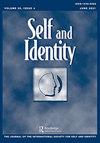Self-construals predict personal life satisfaction with different strengths across societal contexts differing in national wealth and religious heritage
IF 2.1
4区 心理学
Q3 PSYCHOLOGY, SOCIAL
引用次数: 0
Abstract
ABSTRACT We explore to what extent previously observed pan-cultural association between dimensions of self-construal and personal life satisfaction (PLS) may be moderated by three national-contextual variables: national wealth, economic inequality, and religious heritage. The results showed that Self-reliance (vs. dependence on others) predicted PLS positively in poorer countries but negatively in richer countries. Connectedness to others (vs. self-containment) predicted PLS more strongly in Protestant-heritage countries. Self-expression (vs. harmony) predicted PLS more weakly (and non-significantly) in Muslim-heritage countries. In contrast, previously reported associations of self-direction (vs. reception-to-influence), consistency (vs. variability), and decontextualized (vs. contextualized) self-understanding with personal life satisfaction were not significantly moderated by these aspects of societal context. These results show the importance of considering the impact of national religious and economic context.在国家财富和宗教传统不同的社会背景下,自我理解对个人生活满意度的预测具有不同的优势
摘要我们探讨了先前观察到的自我建构维度和个人生活满意度(PLS)之间的泛文化关联在多大程度上可能受到三个国家背景变量的调节:国家财富、经济不平等和宗教遗产。结果表明,在贫穷国家,自力更生(相对于依赖他人)对PLS的预测是积极的,但在富裕国家则是消极的。与他人的联系(相对于自我遏制)对新教传统国家PLS的预测更为强烈。自我表达(相对于和谐)对穆斯林传统国家PLS的预测较弱(且不显著)。相比之下,先前报道的自我指导(与对影响的接受)、一致性(与可变性)和去文本化(与情境化)的自我理解与个人生活满意度的关联并没有受到社会情境这些方面的显著调节。这些结果表明了考虑国家宗教和经济背景影响的重要性。
本文章由计算机程序翻译,如有差异,请以英文原文为准。
求助全文
约1分钟内获得全文
求助全文
来源期刊

Self and Identity
PSYCHOLOGY, SOCIAL-
CiteScore
5.10
自引率
5.00%
发文量
26
期刊介绍:
Work on self and identity has a special place in the study of human nature, as self-concerns are arguably at the center of individuals" striving for well-being and for making sense of one"s life. Life goals develop and are influenced by one"s view of what one is like, the way one would ideally like to be (or would like to avoid being), as well as one"s perceptions of what is feasible. Furthermore, conceptions of self and the world affect how one"s progress towards these goals is monitored, evaluated, redirected, re-evaluated, and pursued again. Thus, the “self” as a construct has far-reaching implications for behavior, self-esteem, motivation, experience of emotions and the world more broadly, and hence for interpersonal relationships, society, and culture.
 求助内容:
求助内容: 应助结果提醒方式:
应助结果提醒方式:


